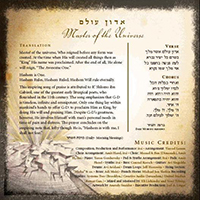 Adon Olam (“Eternal Lord” or “Lord of the Universe”) is a strictly metrical hymn in the Jewish liturgy written in Iambic tetrameter. It has been a regular part of the daily and Shabbat (Sabbath) liturgy since the 15th century.
Adon Olam (“Eternal Lord” or “Lord of the Universe”) is a strictly metrical hymn in the Jewish liturgy written in Iambic tetrameter. It has been a regular part of the daily and Shabbat (Sabbath) liturgy since the 15th century.
Its authorship and origin are uncertain. It is often attributed, as least tentatively, to Solomon ibn Gabirol (1021–1058), who is known for his Hebrew poetry, but there is no solid evidence apart from the quality of this hymn and the language appears to be older. It has also been attributed to Rav Hai Gaon (939-1038) and even to the Talmudic sage Yohanan ben Zakkai. Although its diction indicates antiquity, it did not become part of the morning liturgy until the 15th century.
The Adon Olam is one of the most familiar hymns in the whole range of the Jewish liturgy, employed in the various rituals all over the world, though not always at the same period of the service or on the same occasions. This song is sung to many different tunes, and can be sung to virtually any due to its meter. Many synagogues like to use “seasonal” tunes, for instance, Shabbat before Hanukkah, they might do it to Maoz Tzur. In Hebrew schools and Jewish summer camps, the Adon Olam hymn is sometimes set, for fun, to secular tunes like “Yankee Doodle”. In 1976, Uzi Hitman created a more upbeat tune for the 8th Annual Hasidic Song Festival. This version has become a favorite worldwide sung outside traditional liturgical settings.
This song is dedicated to the Jewish Holocaust and is part of the Gedenk movement. The Gedenk Movement (Remember!) A humanitarian campaign to raise youth awareness about genocide through art and education. Gedenk is a word that means “remember” in Yiddish.